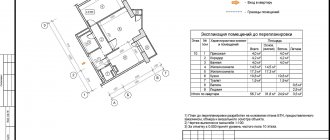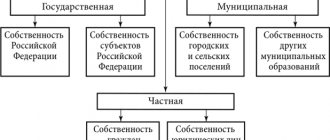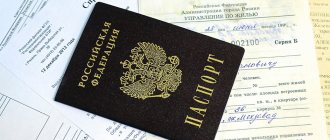How to draw up and obtain papers for legal ownership of land is a question that interests almost every future owner of a land plot. Obtaining property rights is a new procedure for many. Many factors depend on the situation at hand.
Dear readers! Our articles talk about typical ways to resolve legal issues, but each case is unique. If you want to find out how to solve your particular problem, please use the online consultant form on the right or call. It's fast and free!
To obtain a new legal document, residents of the Russian Federation can submit papers to the following authorities:
- Rosreestr.
- Registration cadastral chamber.
- MFC.
Good to know! The application procedure is quite simple; you need to contact one of the indicated authorities with a complete package of documentation. This will establish the right to own property. The result of the application is considered to be the receipt of a document for the legal possession of a land plot (house, etc.).
Documents confirming the right to a land plot
Documents certifying the rights of owners to a particular object are approved by modern legislation of the Russian Federation, namely, Art. 26 Land Code of the Russian Federation. This is due to the fact that registration of ownership of a land plot involves entering changed information about the owners of the land into the unified state register.
It is within the framework of the register that all the necessary information on real estate transactions, including land plots, is accumulated, which is recorded by title documents on property and a general book of documents.
After the authorized body receives an application from a citizen to register a land plot, a new case is opened, which includes all the supporting documents necessary to complete the procedure for registering rights.
As for the book of documents, it stores a complete list of papers that contain information:
- about documents accepted and issued to the owner;
- about real estate (including land plots), which is subject to registration;
- about the new owner who will be given ownership rights to the land plot;
- about certificates and additional extracts that were ordered in the unified state register;
- about the presence of a receipt, which indicates that the state duty for registering property rights has been paid.
If necessary, other documents on rights to land plots that are required to complete the transaction are filed in the case.
general characteristics
The document shows the right of a citizen or legal entity to own a land plot. It reflects the legal status of the plot. It is in this document that interested parties, the copyright holder himself, can find information about the land allotment, as well as its status. Data on the category of land, VRI, types of property and other characteristics of the site are also entered there. The old certificate is no longer issued, but has legal force.
A little history
As we know, in the USSR property was state owned. And private property as a legal concept was excluded from everyday life. But information about land plots that were provided by citizens, for example, by government departments where they worked, was reflected in a special register.
Also, certificates dating back to 1993 were issued for three years in a row. Their implementation was associated with Presidential Decree No. 1767. But these certificates established the right of citizens not to private, but to common shared property.
Interesting: according to paragraph 3 of the Decree, the certificate is a document that certifies a citizen’s ownership of a land plot. And it acts as a document - the basis for carrying out transactions of a civil nature: purchase and sale, donation, pledge, lease. In addition, having this document in hand, you can carry out other legal actions in accordance with current laws.
Time takes its course. In Russia, N218-FZ was adopted, which regulated the process of registering real estate. A special body was allocated for this. Now it is called Rosreestr.
With the introduction of private ownership of land, houses and apartments, citizens began to be issued paper certificates in blue and pink shades. They confirmed the fact that the plot belonged to the citizen. Externally, the evidence changed.
In 2021, for some reason, the paper version of the document was abolished. Instead, an extract from the Unified State Register of Real Estate became a document certifying the rights of owners to real estate objects. It has equal legal force with the certificate.
Application for registration of land ownership rights
State registration of rights to land plots is carried out only if an application from an interested party is sent to the justice authority, which is supported by a package of additional documents. If the ownership right will be registered not by the subject himself, but by his legal representative, then a power of attorney is required, which is certified by a notary.
An application for the right to a land plot is filled out according to a single template, the form of which is fixed by law. The application must be certified by the signature of the applicant, but in the personal presence of the registrar. If the application and documents are sent by mail to the justice authority, they must be certified by a notary.
If the application was completed with violations or the full package of documents that established the legislative procedure was not provided, then the authorized body returns the documents for a certain period of time, which is necessary to make changes. If corrections are not made within the specified period, state registration of the right will be legally denied.
Where to get it?
Certificates of ownership, as well as extracts from the Unified State Register and Unified State Register , are issued by a special federal body that is authorized by the state to register land documents - the Office of the Federal Service for State Registration, Cadastre and Cartography (Rosreestr Office).
the Unified Register, created and maintained up to date, contains data on all immovable objects located in the country, land plots, as well as their rights holders.
The owner of the land can submit an application and title documents (according to the list established by law) to the Rosreestr Office in person, by contacting the multifunctional center (MFC) or with an electronic application on the Rosreestr portal.
The recipient of the ownership documents is the copyright holder.
Certificate of registration of rights to a land plot
State registration of rights to land plots implies a certain procedure, which ends with the owner being issued an official certificate. This document contains comprehensive information not only about the object of the transaction, but also about the newly created owner, as well as the government body that carried out the registration.
The certificate of ownership of land has a standard form, which was approved by the Rules for maintaining a unified state register of rights. The certificate is a small form, which is printed by government order on stamp paper. The document has legal force and has its own unique number, so the certificate is issued under strict reporting to authorized persons, after which the applicant’s right to the land plot is signed by the applicant.
The certificate must include the following details:
- The grounds that formed the basis for registering property rights. In this case, the document on the basis of which the transfer of rights was carried out is indicated. This could be an agreement on a purchase and sale transaction, a certificate of a citizen entering into an inheritance, a gift agreement, etc.
- Information about the subject of law. The certificate must contain the full name of the property owner, the applicant’s date of birth, place of residence and basic passport data.
- Type of registered right. A certificate is issued not only when registering property rights, but also when the right to perpetual (or permanent) use of a land plot, easement, etc. arises.
- Information about the object to which the right applies (general description of the property, location address, area, purpose, etc.).
- Cadastral number. This identifier is assigned to each object in the BTI, cadastral chamber or other body endowed with similar competence.
- Grounds for imposing restrictions on the right (lease, easement, mortgage, etc.).
- Unified State Register details (number, date).
What papers are issued after the privatization of a plot?
Until 2015, after transferring one’s plot of land into ownership, the owner was issued a certificate. This was confirmed by the fact of the execution of the transaction that occurred between the citizen and the state. Such certificates could be obtained from Rosreestr.
Documentation was required for any property registered under the law. These include residential premises, various buildings, private houses, and land plots. Attached to them was the document on the basis of which this Certificate was issued.
After July 15, 2021, such papers are no longer issued; the resulting rights to any real estate or plots of land are confirmed by extracts from the Unified State Register.
Important! That previously obtained certificates are also legal, they should not be replaced.
State act on the right of ownership of perpetual (permanent) use
The key features of the procedure for registering the right to perpetual use of land are that it is not a certificate that confirms ownership, but a state act. This act was approved by a resolution of the Council of Ministers of the RSFSR of 1991.
According to Resolution No. 493, an act in Form No. 1 or No. 2 has the same legal force as compared to the entries made in the Unified State Register.
An act for the right to perpetual use of a land plot may be replaced by another act if:
- the legal regime for land use was changed;
- consolidation or, conversely, disaggregation of land ownership occurred;
- changes were made to the land plot, which makes it possible to highlight the unique features of such territories;
- the act becomes difficult to understand, since many changes have been made to it;
- the transfer of ownership rights of perpetual use to another entity was carried out.
The concept of “deed” appears in land legislation and legal practice quite often, since such a form, despite its characteristics, is very common for securing property rights.
Why do you need a registration certificate?
Citizens who use a land plot on the basis of an open-ended contract issued by the municipality, as a rule, want to privatize it. The fact is that the privatization procedure is necessary to secure the right of ownership to a citizen. According to Russian legislation, every citizen has the right to take advantage of the free privatization procedure once. In order to register ownership of a land plot, it will need to be assigned a cadastral number and register the land plot with the Cadastral Chamber. What will need to be done for this?
- Contact a cadastral engineer and order a procedure for surveying the territory on which this plot of land is located.
- Find out the boundaries of the land plot.
It is worth noting that this procedure is expensive. In addition, when registering ownership rights to a land plot, a citizen undertakes to pay taxes for it.
When registering a license, you will also need to pay a state fee.
If a citizen has identified his intention and carried out the privatization procedure, he becomes the legal owner of the land.
This right should be granted in the following cases:
Dear readers! We cover standard methods for solving legal problems, but your case may be unique. We will help you find a solution to your problem for free
— simply call our legal consultant at:
+7 (495) 128-73-40 (Moscow)
+7 (812) 603-71-55 (Saint Petersburg)
8 (800) 302-33-75 (free call within Russia)
It's fast and free ! You can also quickly get an answer through the consultant form on the website.
- If a citizen wants to sell his plot. If a land plot has been assigned a cadastral number, but ownership rights to it have not been obtained, the sale will be considered invalid or illegal. A citizen uses the land before its privatization, which remains the property of the state or municipality, which has the right to sell, donate, alienate, lease or exchange the land plot for other objects.
- If a citizen has expressed a will to buy land, then ownership must be registered for the plot and the buyer directly. Then you will not need to order a land survey plan again.
- If a citizen takes out a mortgage loan. If a citizen plans to register land on collateral, he first needs to register it in his own name.
- If a citizen has expressed the will to build an object, for example, a residential building. In this case, it is also necessary to register ownership, since it is illegal to build objects on non-privatized land unless the municipality has previously given permission.
- A non-privatized land plot can be taken back by the state for its own needs.
- If a citizen has conflicts with neighboring owners.
Registration of ownership of a land plot. State registration fee
State registration of rights to a land plot grants the owner the right not only to use the specified territory, but also to dispose of the land plot at his own discretion.
In other words, the owner, after registering the right with the justice authorities, will be able to use the land plot for the construction of residential and commercial buildings, for agricultural needs or for running his own subsidiary plots. In addition, registration of rights provides the opportunity to sell, donate or inherit land, since there are legal grounds for this.
Registration of the right to an indefinite (permanent) right to use a land plot is possible after the state fee has been paid. In this case, the state duty will depend on the final purpose of using the plot:
- individuals will have to pay a fee in the amount of 350 to 1000 rubles if the land is used for the construction of a residential premises, a garage or for running a vegetable garden. In such a case, legal entities are subject to a state duty of 15,000 rubles.
- The state duty on a land plot, the ownership of which is acquired for the use of the plot in order to meet agricultural needs, will be 100 rubles.
- The state duty on a land plot for shared construction will also be 100 rubles.
Error in document
If a technical error (typo, grammatical or other error) is detected in a certificate or extract of ownership of a plot of land, a person interested in correcting the error has the right to submit an application in the established form to correct the technical error in the USRN records.
The application will be reviewed and the error will be corrected based on the decision of the state registrar within three (working) days. The applicant will receive a notification that the technical error has been corrected.
If you receive a refusal to correct a detected error in a document, the decision of Rosreestr can be appealed in court.
Do you want to donate part of the house and part of the land? The procedure and features are described in this article.
The complete procedure for buying and selling a summer house is described here.
Grounds and period of state registration of rights to land plots
The acquisition of land plots can occur taking into account the following grounds:
- a transaction aimed at the purchase and sale of an allotment took place;
- if the land plot is provided to subjects of legal relations by a state or municipal body. In particular, it is possible to transfer land on a free basis, which is regulated by Article 3 of the Law “On the Entry into Force of the Land Code of the Russian Federation”;
- if a court decision has been made, according to which a citizen has the right of ownership of a particular plot;
- such a concept as “inheritance” is also one of the most key grounds for the emergence of property rights;
- Acquisitive prescription gives the opportunity to subjects to take ownership of a land plot if they have conscientiously used the specified plot for a long time.
If registration of land ownership takes place in Rosreestr, then the duration of this procedure should not exceed 15 calendar days after the body receives the necessary documents. This period was established in order to improve the quality of government services provided.
Cancellation of the state registration certificate from 2021
It should be immediately noted that from July 15, 2021, a certificate of registration of a land plot is no longer issued, as well as for other immovable properties. Please note that, accordingly, these forms have not been used since 2017. On the other hand, this does not mean at all that the certificates of land ownership received by citizens before this time have lost their legal validity; they still have it. Moreover, the owners do not necessarily have to change them for new title documents. Until the end of 2021, instead of the usual certificates, so-called extracts from the Unified State Register were temporarily, but exclusively, issued, but they are no longer issued today.
In fact, since January 2021, in connection with the unification of the state cadastre and the Unified State Register database into a single database, which is now available to Rosreestr, an extract from the Unified State Register has come to completely replace the certificate of ownership for each land plot that becomes someone else's private property.
The Ministry of Economic Development, which approved this decision, explaining the advisability of switching to a new type of document, referred to the need to provide additional guarantees to real estate owners and protection from fraudsters and dishonest sellers.
In other words, the state is thus tightening control over transactions, transferring into the hands of Rosreestr absolutely all available information on each object and limiting the possibility of concluding transactions on old securities. Despite the fact that the legal certificates previously received by citizens still have legal force, an extract from the Unified State Register of Real Estate is now required for ongoing real estate transactions. If the transfer of ownership rights is not planned in the near future, it is not necessary to receive it.
The process of registering property rights itself has not changed; the same documents are required and filling out an application to the territorial office of Rosreestr, the Multifunctional Center or, as an option, completely online through the official website of government services.
General issues
In 2021, a Certificate of Land Title will not be issued. Instead, a citizen can receive an extract from the Unified State Register of Real Estate, which contains the same information and has the same legal status as the previous document.
The issuance of the Certificate was suspended in the summer of 2021, when the Federal Law “On Amendments to Legislative Acts of the Russian Federation” came into force. In this case, the extract is accepted by various organizations on a par with the Certificate.
Document meaning
What does the issuance of such a document by Rosreestr mean? Such a paper certifies the right that a citizen has to a certain plot of land. Without a document, a person retains this right. But he can dispose of his property only if he confirms his legal right. And the only proof of this is an entry in the Unified State Register of Real Estate.
Documents for land plots can be title-establishing and title-certifying. A certificate of ownership of land and an extract from the Unified State Register are among the latter, that is, certifying the title. They have legal force only together with the corresponding title paper.
Citizens of the Russian Federation cannot buy any plot they like. Therefore, not every plot of land can receive a Certificate of Title. The lands that make up the unified land fund of Russia are divided into 7 categories. In the state cadastre, each plot registered has a category.
Citizens can buy and build, mainly on the lands of settlements. Another common category is agricultural land not intended for development, but there are exceptions. The state sets certain restrictions for other categories. As, for example, for the water fund or specially protected lands.
Important parameters
By law, every Russian citizen can register a plot of land for free once in his life. According to land legislation, further registration will be paid. As already mentioned, not every plot can be registered as a property. If the land belongs to a category that cannot be privatized, the applicant will be refused.
Previously, before the adoption of the new Land Code, land registration required applying to no less than 15 different authorities. Now the entire sequence of actions of those who want to receive land is outlined. First, you need to get a cadastral plan.
The sequence of actions is as follows:
- If the plot is registered with the state cadastre authorities, then you need to make a request for a copy of the document. There is a fee for this. A copy on paper costs 800, in electronic form - 250 rubles. Production time is no more than 5 working days.
- If the cadastral plan and other information necessary for registration are missing, then you can obtain an exact list of all missing documents from Rosreestr.
- To clarify the boundaries of a land plot, you need to contact a specialized company. After concluding the contract, they will send you a cadastral engineer who will take all the necessary measurements and prepare documentation for the state cadastral authorities, including the plan. It displays all objects located on the site and next to it. Such work is carried out in agreement with neighbors.
- A cadastral engineer, who has a special qualification certificate, sends papers to the cadastral authorities.
- The processing time for papers is no more than 30 days. After which cadastral documents are issued.
Next, you need to obtain title documents. They are the basis for registering property rights.
These include:
- contracts of sale, exchange and donation;
- privatization agreement;
- document on the right to inheritance;
- the court's decision;
- orders of local authorities (Councils of People's Deputies, etc.) on the provision of a land plot for use.
It is possible to obtain a registration document without land surveying. In this case, the cadastral plan will contain the note “the boundaries and area are not precisely defined.” The value of such a plot will be low and it will be more difficult to sell it than those that have undergone the land surveying procedure.
Sample land donation agreement:
In what cases is this realistic and necessary?
Not everyone who owns a plot of land with the right of use wants to transfer it into ownership. Why is this happening? Despite the fact that, according to the law, every citizen has the right to privatize any property once free of charge, before this the land must be registered in the cadastral register.
To do this, the owner of the plot calls a cadastral engineer, who carries out the procedure for surveying and clarifying the boundaries of the land plot. This is an expensive event that not everyone can afford. In addition to these costs, a state fee for the procedure for registering property rights is added.
When a citizen becomes an owner, he has to pay tax on his property. Therefore, many do not privatize their plots, since by law they have the right to pass them on by inheritance. But such a plot cannot be sold, donated, exchanged or rented.
It is necessary to register ownership of a plot in the following cases:
- Upcoming sale of allotment. If it is not registered in the cadastral register and is not privatized, then by law the purchase and sale transaction will be declared invalid. In this case, the object of the transaction will, according to the documents, belong to the state, so it cannot be sold, nor can it be exchanged or donated.
- If you buy a plot, you register ownership of the land you purchased. In this case, there will be no need to undergo repeated land surveying and cadastral registration.
- When is the mortgage lending procedure coming up? If you want to receive money from a bank secured by land, then you must register it as your property. Firstly, the bank will require title documents for the site. Secondly, an independent assessment of the property will be based on the status of the site, which is indicated in the documents. For example, the category of agricultural land is unlikely to be considered by the bank as collateral, since the prices for such plots are very low. A site with the permitted use of SNT or private household plots will also be questionable. Banks are usually reluctant to “take” such land. But the option of land for individual housing construction may be suitable.
- Without registering ownership of the land, it is impossible to build a new house on it (with the exception of renting plots for individual housing construction, but they will also have to be registered after construction is completed). Houses built before the introduction of the new land legislation can be legitimized, that is, property rights can be registered. But when registering it, you will have to first (or simultaneously) take ownership of the land.
- There is a slight danger that the unregistered land could be taken away by the state if necessary. Of course, most often the authorities meet the population halfway and move construction to other places. But it’s better if the house and land are legally yours, then no one can take them away.
- Conflicts with neighbors in the area. In court, a Certificate or an extract from the Unified State Register will have much greater legal weight.
The most important purpose of registration is to obtain full rights to land. It is after receiving the documents that you have property in your hands that can be sold. In fact: through several procedures you become the owner of real estate.
Sample certificate of land ownership








